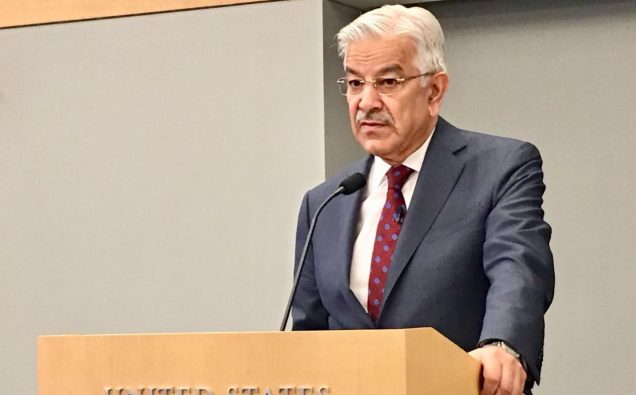
Foreign Minister Khawaja Muhammad Asif has underlined the importance of U.S.-Pakistan cooperation toward regional stability and sharing the benefits of regional connectivity across the region.
“One of the key pillars of our policy is to strengthen regional integration and economic connectivity,” Asif said at the US Institute of Peace in Washington D.C.
He described China Pakistan Economic Corridor as the most conspicuous element of this policy, and added the CPEC embraces a number of infrastructure and development projects.
He was referring to a network of roads and energy projects that China and Pakistan are constructing under the $ 54 billion CPEC project.
Pakistan, he said, is also promoting other regional connectivity projects such as Central Asia South Asia (CASA) -1000 power project.
“Clearly the dividends of achieving security and peace can be shared throughout the region.
“And this is where both Pakistan and the United States can work together. We can together build on an improved security environment in Pakistan by expanding this arc of stability. This will strengthen regional economic connectivity, promote trade and bring prosperity to the whole region.”
The foreign minister, who is meeeting with foreign policy and natioinal security officials of President Donald Trump’s Administration, said improved security in Pakistan has led to stability higher economic growth in his South Asian country – bordered by India and Afghanistan China and Iran – countries of key interest to the United States.
Asif told a gahtering of American think tank and foreign policy experts that Pakistan has registered rising growth rates for successive years.
The economic growth rate was just 3% in 2013 and it increased to 5.3% in the 2016-17 fiscal year – the highest in a decade. The economy is forecast to sustain high growth rates in coming years.
He also referred to positive assessment Pakistan has achieved from the leading financial institutions.
With improved forecasts by international credit rating agencies such as Moody’s and Standard & Poor, World’s leading Manufacturers and energy conglomerates are viewing Pakistan as an attractive destination. Tourism is expanding, Energy demand is rising and the retail market has been labeled as the fastest growing in the world.
India, Pakistan’s eastern neighbor and rival, opposes the CPEC, claiming that it runs through the Kashmir territory, which it claims in its entirety. The two South Asian rivals have fought several wars and conflict with experts believing UN-recognized Kashmir dispute to be the core cause of tensions between them.
In his speech, Asif also drew attention to the plight of Kashmirs. He also reaffirmed Islamabad’s commitment to work with the United States for peace and stability in Afghanistan and supported Afghan-owned and led reconciliation as a means to tha end.


















